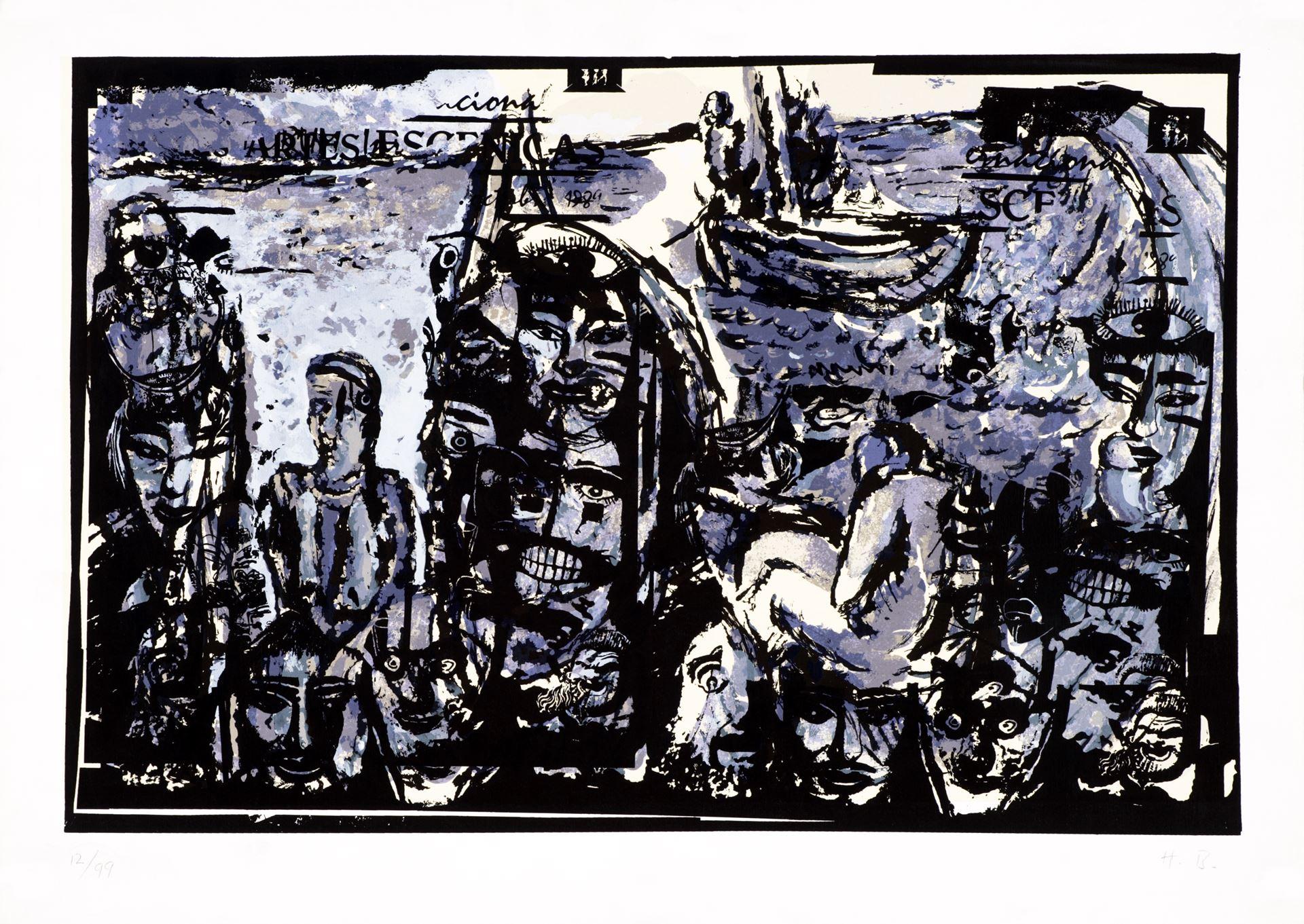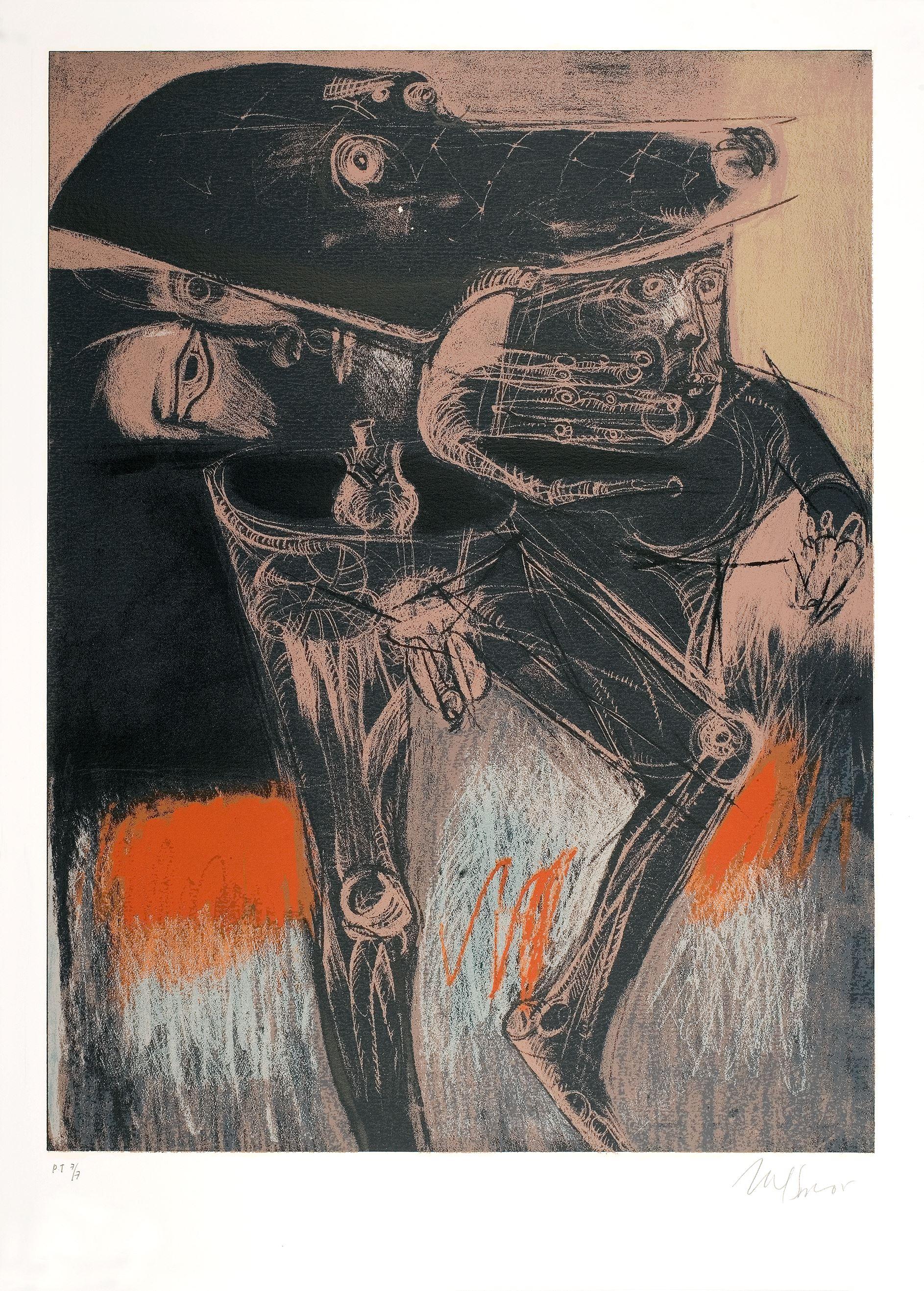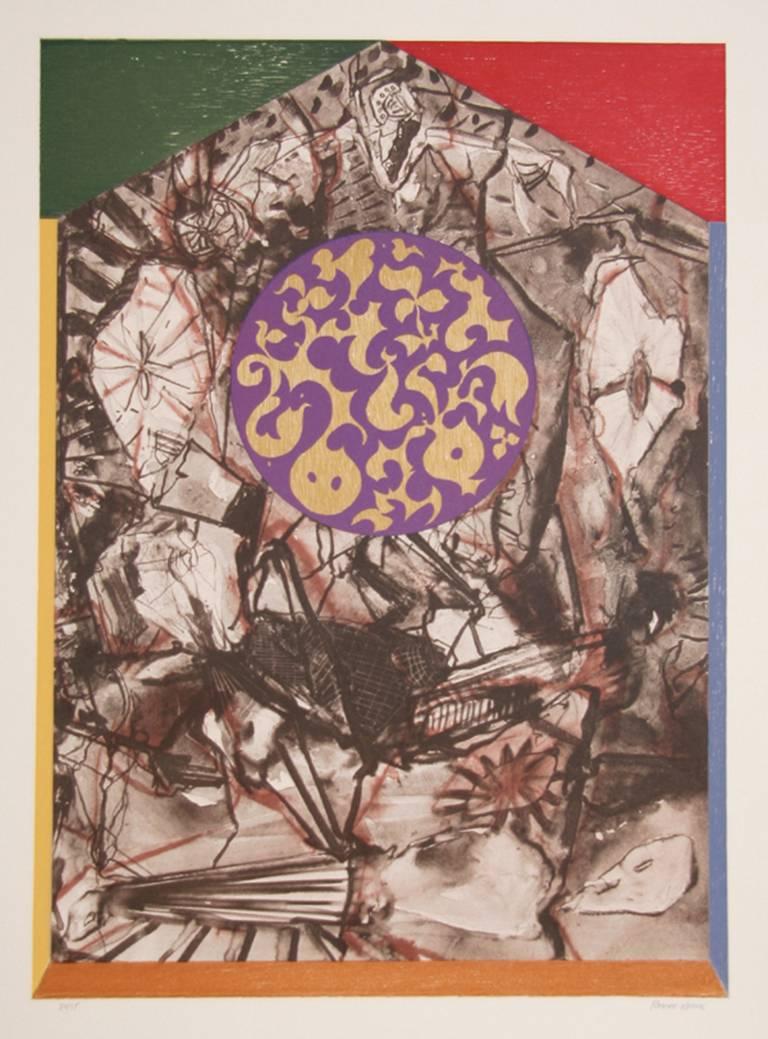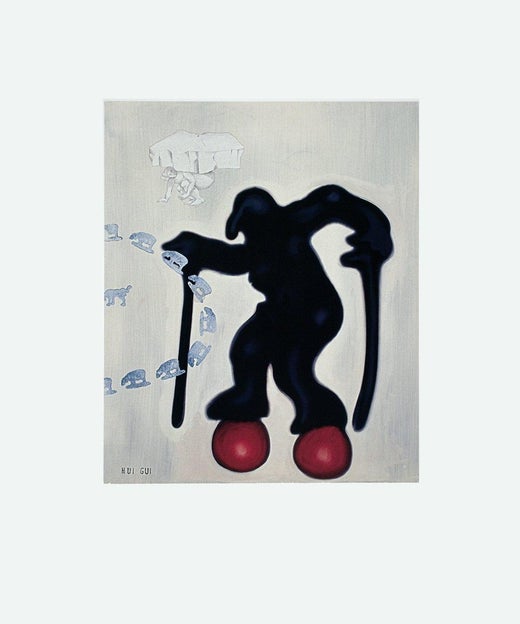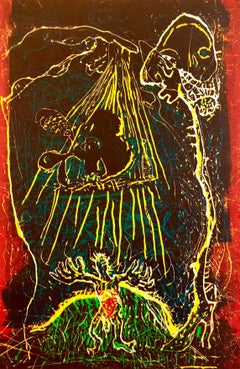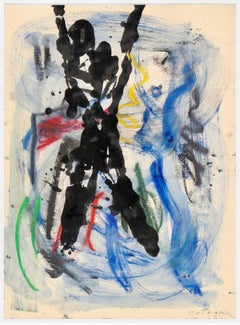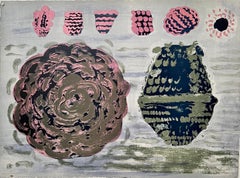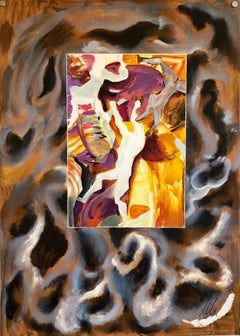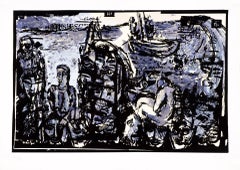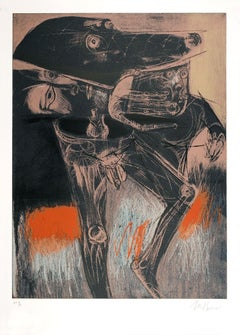Items Similar to Large Silkscreen Serigraph Neo Figurative Expressionist Print Jorg Immendorff
Want more images or videos?
Request additional images or videos from the seller
1 of 11
Jörg ImmendorfLarge Silkscreen Serigraph Neo Figurative Expressionist Print Jorg Immendorff2006
2006
$9,500
£7,248.76
€8,246.01
CA$13,341.08
A$14,600.20
CHF 7,714.93
MX$174,263.09
NOK 98,452.08
SEK 90,042.44
DKK 61,593.38
About the Item
Jorg Immendorff (German, 1945-2007)
Untitled, Germany, 2006
serigraph
hand signed and dated lower right margin, numbered 20/27 lower left
framed
74.5 x 48.75 inches (sight).
82.25 x 55.5 inches (frame).
This work is number 20 from the edition of 27.
Provenance: T. Kreuzer Gallery, Cologne, Friedman Benda Gallery, New York City
Jörg Immendorff (1945–2007) was a German painter, sculptor, stage designer and art professor. He was a member of the art movement Neue Wilde. He worked as a painter, sculpture and print maker in steel, bronze, oil painting, lithography etching and serigraphy.
Immendorff was born in Bleckede, Lower Saxony, near Lüneburg on the west bank of the Elbe. He attended the boarding School Ernst-Kalkuhl Gymnasium as a student. At the age of sixteen he had his first exhibition in a jazz hall cellar in Bonn.
Beginning in 1963, Immendorff studied at the Art Academy in Düsseldorf (Kunstakademie Düsseldorf). Initially he studied for three terms with the theater designer Teo Otto. After Otto threw him out of his class for refusing to let one of his paintings serve as stage-set decoration, Immendorff was accepted as a student by Joseph Beuys. The academy expelled him because of some of his (left-wing) political activities and neo-dada actions.
From 1969 to 1980, Immendorff worked as an art teacher at a public school, and then as a free artist, holding visiting professorships all over Europe. In 1989, he became professor at the Städelschule in Frankfurt am Main and in 1996 he became professor at the Art Academy in Düsseldorf—the same school that had dismissed him decades earlier as a student.
Jörg Immendorff often worked in "grand cycles of paintings" that often lasted years at a time and were political in nature. Notable cycles include LIDL, Maoist Paintings, Cafè Deutschland , and The Rake's Progress. The first body of work that Immendorff gave a name to were his LIDL paintings, sculptures, performances, and documents, that he executed during 1968-1970. The name, "LIDL" was inspired by the sound of a child's rattle makes and much of his work from this period included the iconography of new beginnings and innocence. LIDL is comparable to Dadaist but unlike the Dada movement it never became an established group but rather consisted of a variety of artists (including James Lee Byars, Marcel Broodthaers, Nam June Paik, and Joseph Beuys) participating in actions and activities.
In January 1968 he appeared in front of the West German Parliament in Bonn with a wood block labeled “Lidl” tethered to his ankle and painted in the colors of the German flag; he was subsequently arrested for defaming the flag.
Best known is his Cafe Deutschland series of sixteen large paintings (1977–1984) that were inspired by Renato Guttuso Caffè Greco; in these crowded colorful pictures, Immendorff had disco-goers symbolize the conflict between East and West Germany. Since the 1970s, he worked closely with the painter A. R. Penck from Dresden (in East Germany).
Immendorff created several stage designs, including two for the Salzburg Theater Festival. He designed sets for the operas Elektra and The Rake's Progress. The latter also inspired a series of paintings in which he cast himself as the rake.
In 1984, Immendorff opened the bar La Paloma near the Reeperbahn in Hamburg St. Pauli and created a large bronze sculpture of Hans Albers there. He also contributed to the design of Andre Heller's avant-garde amusement park "Luna, Luna" in 1987. Immendorff created various sculptures; one spectacular example is a 25 m tall iron sculpture in the form of an oak tree trunk, erected in Riesa in 1999. In 2006, Immendorff selected 25 of his paintings for an illustrated Bible. In the foreword he described his belief in God.
A major 2019 survey began at the Haus der Kunst in Munich and later traveled later to the Museo Reina Sofía in Madrid and the Fondazione Querini Stampalia in Venice, curated by Francesco Bonami. In 2000, Immendorff married his former student Oda Jaune. The have one daughter Ida Immendorff. He was a member of the Junge Wilde (German for "young wild ones")
In 1978, the Junge Wilde painting style arose in the German-speaking world in opposition to established avant garde, minimal art and conceptual art. It was linked to the similar Transavanguardia movement in Italy, USA (neo-expressionism) and France (Figuration Libre). The Junge Wilde painted their expressive paintings in bright, intense colors and with quick, broad brushstrokes very much influenced by Professor at the Academy of Art in Berlin, Karl Horst Hödicke (b:1938). They were sometimes called the Neue Wilde. Berlin: Luciano Castelli, Rainer Fetting, Salomé, Bernd Zimmer, Elvira Bach. Cologne: Jiri Georg Dokoupil, Düsseldorf: Jörg Immendorff, Albert Oehlen, Markus Oehlen, Martin Kippenberger, Markus Lüpertz, Werner Buettner, Peter Angermann. The most famous are Anselm Kiefer and Georg Baselitz.
On 27 May 2007, at the age of 61, he succumbed to the disease. He died in Düsseldorf and his ashes were scattered in the Mediterranean Sea. I
In 1997, Immendorf won the world's best endowed art prize at the time, the MARCO prize of the Museum of Contemporary Art in Monterrey, Mexico. In the following year he received the merit medal (Bundesverdienstkreuz) of the Federal Republic of Germany.
Immendorf was considered a friend and the favorite painter of former German Chancellor Gerhard Schröder, who chose him to paint his official portrait for the Federal Chancellery. The portrait, which was completed by Immendorff's assistants, was revealed to the public in January 2007; the massive work has ironic character, showing the former Chancellor in stern heroic pose, in the colors of the German flag, painted in the style of an icon, surrounded by little monkeys. These "painter monkeys" were a recurring theme in Immendorff's work, serving as an ironic commentary on the artist's business.
- Creator:Jörg Immendorf (1945 - 2007, German)
- Creation Year:2006
- Dimensions:Height: 82.25 in (208.92 cm)Width: 55.5 in (140.97 cm)
- Medium:
- Movement & Style:
- Period:
- Condition:good. minor wear to frame.
- Gallery Location:Surfside, FL
- Reference Number:1stDibs: LU38215354112
Jörg Immendorf
Jorg Immendorff was a German painter, sculptor, stage designer and art professor. He was a member of the art movement Neue Wilde. Immendorff often worked in "grand cycles of paintings" that often lasted years at a time and were political in nature. Notable cycles include LIDL, Maoist Paintings, Cafe Deutschland , and The Rake's Progress. The first body of work that Immendorff gave a name to were his LIDL paintings, sculptures, performances, and documents, that he executed during 1968-1970. The name, "LIDL" was inspired by the sound of a child's rattle makes and much of his work from this period included the iconography of new beginnings and innocence. LIDL is comparable to Dadaist but unlike the Dadist movement it never became an established group but rather consisted of a variety of artists (including James Lee Byars, Marcel Broodthaers, Nam June Paik, and Joseph Beuys) participating in actions and activities.
About the Seller
4.9
Platinum Seller
Premium sellers with a 4.7+ rating and 24-hour response times
Established in 1995
1stDibs seller since 2014
1,846 sales on 1stDibs
Typical response time: <1 hour
- ShippingRetrieving quote...Shipping from: Surfside, FL
- Return Policy
More From This Seller
View AllLarge Abstract Expressionist Figure Handmade Paper Etching Silkscreen Print
By Sam Messer
Located in Surfside, FL
This is done on a very interesting handmade paper (Japanese?) it is hand signed and numbered.
In this print the artist Sam Messer uses bold contrasting colors in a gestural manner. Messer's work, so apparently spontaneous or impulsive in its emphasis on highly dramatic gestural brushstrokes and intense color, is, in fact, carefully considered. The treatment of the composition conveys dynamic movement through the sweep...
Category
1980s Abstract Expressionist Abstract Paintings
Materials
Handmade Paper, Lithograph, Screen
Alfred Ortega Bold Figurative Abstract Expressionist Oil Monoprint Painting
Located in Surfside, FL
Alfred Ortega (American, 20th C.)
Abstract Monoprint with wash
Ghost of Champs-Élysées (Paris, France)
Born in Philadelphia, Alfred Ortega studied painting and sculpture at the Pe...
Category
20th Century Abstract Paintings
Materials
Oil, Monoprint
Pietro Consagra Italian Mod Abstract Expressionist Forma Art Informel Lithograph
By Pietro Consagra
Located in Surfside, FL
Pietro Consagra (Italian, 1920-2005).
Hand signed in pencil and numbered limited edition color lithograph on Magnani paper.
Embossed stamp with limited edition numbers in pencil to lower left, and having artist pencil signature to lower right.
(from a limited edition of 80 with 15 artist's proofs)
Published by Stamperia 2RC, Rome Italy and Marlborough Gallery, Rome, Italy.
Abstract Modernist work in colors, produced in the style of the Forma art movement of Postwar Italy, of which the artist was a prominent member.
Pietro Consagra (1920 – 2005) was an Italian Post war artist working in painting, printmaking and sculpture. In 1947 he was among the founding members of the Forma 1 group of artists, proponents of structured abstraction. (similar to the Art Informel and Art Brut in France and the Brutalist artists)
Consagra was born on 6 October 1920 in Mazara del Vallo, in the province of Trapani in south-western Sicily, to Luigi Consagra and Maria Lentini. From 1931 he enrolled in a trade school for sailors, studying first to become a mechanic, and later to become a captain. In 1938 he moved to Palermo, where he enrolled in the liceo artistico; despite an attack of tuberculosis, he graduated in 1941, and in the same year signed up at the Accademia di Belle Arti, where he studied sculpture under Archimede Campini. After the Invasion of Sicily and the Allied occupation of Palermo in 1943, Consagra found work as a caricaturist for the American Red Cross club of the city; he also joined the Italian Communist Party. Early in 1944, armed with a letter of introduction from an American officer, he travelled to Rome. There he came into contact with the Sicilian artist Concetto Maugeri, and through him with Renato Guttuso, who was also Sicilian and who introduced him to the intellectual life of the city and to other postwar artists such as Leoncillo Leonardi, Mario Mafai and Giulio Turcato. Consagra signed up at the Accademia di Belle Arti di Roma in September 1944 and studied sculpture there under Michele Guerrisi, but left before completing his diploma.
In 1947, with Carla Accardi, Ugo Attardi, Piero Dorazio, Mino Guerrini, Achille Perilli, Antonio Sanfilippo and Giulio Turcato, Consagra started the artist's group Forma 1, which advocated both Marxism and structured abstraction.
Steadily Consagra's work began to find an audience. Working primarily in metal, and later in marble and wood, his thin, roughly carved reliefs, began to be collected by Peggy Guggenheim and other important patrons of the arts. He showed at the Venice Biennale eleven times between 1950 and 1993, and in 1960 won the sculpture prize at the exhibition. During the 1960s he was associated with the Continuità group, an offshoot of Forma I, and in 1967 taught at the School of Arts in Minneapolis. Large commissions allowed him to begin working on a more monumental scale, and works of his were installed in the courtyard of the Foreign Ministry in Rome and in the European Parliament, Strasbourg. His work is found in the collections of The Tate Gallery, London, in Museo Cantonale d'Arte of Lugano and the Museum of Modern Art, Paris, and the National Gallery of Art in Washington, D.C..
Consagra returned to Sicily where he sculpted a number of significant works during the 1980s. With Senator Ludovico Corrao, he helped created an open-air museum in the new town of Gibellina, after the older town had been destroyed in the earthquake of 1968. Consagra designed the gates to the town's entrance, the building named "Meeting" and the gates to the cemetery, where he was later buried.
In 1952 Consagra published La necessità della scultura ("the need for sculpture"), a response to the essay La scultura lingua morta ("sculpture, a dead language"), published in 1945 by Arturo Martini. Other works include L'agguato c'è ("the snare exists", 1960), and La città frontale ("the frontal city", 1969). His autobiography, Vita Mia, was published by Feltrinelli in 1980. In 1989 a substantial retrospective exhibition of work by Consagra was shown at the Galleria Nazionale d'Arte Moderna in Rome; in 1993 a permanent exhibition of his work was installed there. In 1991 his work was shown in the Hermitage Museum in St. Petersburg. In 2002 the Galerie der Stadt Stuttgart opened a permanent exhibition of his work. He was one of ten artists invited by Giovanni Carandente, along with David Smith, Alexander Calder, Arnaldo Pomodoro, Lynn Chadwick, and Beverly Pepper, to fabricate works in Italsider factories in Italy for an outdoor exhibition, "Sculture nella città", held in Spoleto during the summer of 1962. He was included in the The 1962 International Prize for Sculpture the jury included Argan, Romero Brest and James Johnson Sweeney the former director of the Solomon R. Guggenheim Museum in New York. The participants included Louise Nevelson and John Chamberlain for the United States; Lygia Clark for Brazil; Pietro Consagra, Lucio Fontana, Nino Franchina, and Gió Pomodoro for Italy; Pablo Serrano for Spain; and Eduardo Paolozzi, William Turnbull, and Kenneth Armitage for England. Gyula Kosice, Noemí Gerstein...
Category
1960s Abstract Expressionist Abstract Prints
Materials
Lithograph
Large lithograph Italian Post Modernist Bright Figurative Pop Art Cubism
By Sandro Chia
Located in Surfside, FL
Biography: Sandro Chia was born in Florence in 1946. He has studied at the Istituto d’Arte and then at the Accademia di Belle Arti in Florence where he graduated in 1969. After gradu...
Category
1980s Pop Art Figurative Prints
Materials
Lithograph
Monoprint Monotype American Modernist Gregory Amenoff Abstract Expressionist
By Gregory Amenoff
Located in Surfside, FL
Gregory Amenoff (Contemporary American abstract painter, b. 1948),
Monotype Monoprint (1990)
Hand signed in pencil lower right
plate: 16 x 16 inches
frame dimensions: 35 1/8 x 29 1/8 x 1 5/8 inches, wood frame with glazing
Provenance: Corporate Collection of Bank BNP Paribas
Gregory Amenoff is a painter who lives in New York City and Ulster County, New York. He is the recipient of numerous awards from organizations including the American Academy of Arts and Letters, National Endowment for the Arts, New York State Council on the Arts and the Tiffany Foundation. He has had over fifty one-person painting exhibitions in museums and galleries throughout the United States and Europe. His work is in the permanent collections of more than thirty museums, including the Whitney Museum of American Art, the Museum of Fine Arts in Boston, the Museum of Modern Art in New York and the Metropolitan Museum of Art. His work has the influence of both Abstract Expressionism and Pop Art in it, biomorphic forms in rich hues and thick textures with heightened colors and abstracted, organic forms, late American Modernism. He moved to New York in 1979, the artist rose to critical acclaim in the 1980s alongside Terry Winters, Bill Jensen, and Katherine Porter. The artist lives and works between New York, NY and his Hudson Valley residence. He works in woodcut, lithograph and monoprint techniques.
He was a collaborating artist illustrating Bradford Morrow, Bestiary along with Joe Andoe, James Brown, Vija Celmins, Louisa Chase, Eric Fischl, Jan Hashey, Michael Hurson, Mel Kendrick, James Nares, Ellen Phelan, Joel Shapiro,
Kiki Smith, David Storey, Michelle Stuart, Richard Tuttle, Trevor Winkfield, Robin Winters. Linoleum cuts with
pochoir and woodcuts for the Grenfell Press, New York. Amenoff served as President of the National Academy of Design from 2001-2005. He is a founding board member of the CUE Art Foundation in New York City and serves as the CUE Art Foundation's Curator Governor. Amenoff has taught at Columbia for the last eighteen years, where he holds the Eve and Herman Gelman Chair of Visual Arts and is currently the Chair of the Visual Arts Division in the School of the Arts. He is currently the Vice-President of the National Academy.
In 2011 he received the John Solomon Guggenheim Fellowship.
Museum Collections
Albright-Knox Art Gallery; Buffalo, NY
Art Institute of Chicago; IL
Baltimore Museum of Art;
Brooklyn Museum of Art; Brooklyn, NY
Butler Institute of American Art; Youngstown, OH
Cleveland Museum of Art; Cleveland, OH
Currier Gallery of Art; Manchester, NH
Frances and Sidney Lewis Foundation; Richmond, VA
Hood Museum of Art; Hanover, NH
Honolulu Academy of Art; Honolulu, HW
Kemper Museum of Contemporary Art; Kansas City, MO
Maier Museum of Art; Lynchburg, VA
Metropolitan Museum of Art; New York, NY
Milwaukee Museum of Art; Milwaukee, WI
Minneapolis Institute of Art; MN
Muscarelle Museum of Art, College of William and Mary; Williamsburg, VA
Museum of Fine Arts; Boston, MA
Museum of Modern Art; New York, NY
National Museum of American Art; Washington, DC
Neuberger Museum, State University of New York at Purchase; NY
New York Public Library, Spencer Collection...
Category
1980s American Modern Abstract Prints
Materials
Lithograph, Monoprint, Monotype
Large Format Modernist Abstract Lithograph Silkscreen Print Woman Artist
By Lydia Dona
Located in Surfside, FL
1982-84 Hunter College, New York (M.F.A.)
1978-80 School of Visual Arts, New York
1973-77 Bezalel Academy of Art, Jerusalem (B.F.A.)
American, born in Romania
Lives and works in New York City
Solo Exhibitions
2008 Michael Steinberg Fine Art, New York
2006 Galeria Joan Prats, Barcelona
2005 Karpio + Facchini Gallery, Miami
Jacob Karpio Galeria, San Jose (Costa Rica)
2004 Michael Steinberg Fine Art, New York
2001 Marella Arte Contemporanea, Milan
2000 Von Lintel & Nusser, New York
Galerie Von Lintel & Nusser, Munich
1998 Galerie Thomas von Lintel, Munich
1997 Galerie des Archives, Paris
1995 Galerie Samuel Lallouz, Montreal
L.A. Louver, Los Angeles
1994 Marc Jancou Gallery, London
Galerie des Archives, Paris
1993 Galerie Barbara Farber, Amsterdam
Real Art Ways, Hartford (Connecticut)
1992 Tom Cugliani Gallery, New York
Galerie Marc Jancou, Zurich
Galerie des Archives, Paris
1989 Tom Cugliani Gallery, New York
Galerie Barbara Farber, Amsterdam
Studied at bezalel from 1973 to 1977. And it was a very fascinating time because it was a highly conceptually based school. Very much influenced by Joseph Beuys, and European Conceptualism, I didn’t really like the atmosphere there that much, because it was dominated by male painters like Jörg Immendorf, Marcus Lupertz, and a few others. then came to New York to study at SVA for two years. New York in 1978 was exciting. I was very lucky to be in a class that was full of very bubbly and very energetic artists like Keith Haring, Kenny Scharf, Tim Rollins, Moira Dryer, Frank Holliday, and Tom Cugliani (who later became one of my dealers).The eighties were dominated largely by Neo-Expressionist paintings. There were Germans, such as Baselitz, Kiefer, Richter, Penck, and the Italians, Clemente, Chia, Cucchi, Palladino as well as Schnabel, Fischl, Basquiat, Salle, and many others, but all of their paintings were figuratively based. But below the popular consent, there was a group of painters who were working more in the vein of what Stephen Westfall referred to as “Neo-Surrealism,” including George Condo, Jeffrey Wasserman, Kenneth Scharf, David Humphrey. However, I felt that Carroll Dunham and you were the only two painters who seemed to be less interested in the kind of narrative, lyrical, or let’s say, stationary composition. He belongs to the generation of Terry Winters, Elizabeth Murray, David Reed and Jonathan Lasker but in some strange way, if we’re looking back to the mid-eighties, we have to include New Image painters like Susan Rothenberg, Neil Jenney, and Robert Moskowitz who were working in between the figure and abstraction with a kind of condensation and compression, in relationship, lets say, to cartoon imagery. There are artists like Jeff Koons, or even Damien Hirst who took the Duchampian aspect and brought it into the continuity of his readymade. But for me, I see no difference between the crack in “Large Glass” and the drips in Jackson Pollock’s paintings. There was something that I felt in my own equation of the continuity between Paul Klee, Duchamp, Picabia, and, oddly enough, Clyfford Still.
What essentially is important is how different artists carry on a dialogue among themselves so that they can all keep their work vital. Whether from the abstract paintings of Richmond Burton, Fabian Marcaccio extending the borders of his paintings on to the wall, or Cady Noland’s early scattered installation, my own pre-occupation with machinery, urban environment, and the Duchampian models has always materialized in relationship to other forms of art making.
Selected Group Exhibitions:
2014 Drawing on Difference: An Ambition by Saul Ostrow and Lidija
Slavkovic, Studio Vendome Gallery, New York.
2013 Drawing on Habit: An Ambition by Saul Ostrow and Lidija Slavkovic,
South Carlton Beach and The Betsy-South Beach Exhibition Programs,
Art Basel, Miami Beach.
2013 Imprinted Pictures: Lydia Dona...
Category
1980s Abstract Expressionist Abstract Prints
Materials
Lithograph, Screen
You May Also Like
Oxos II, Large Abstract Expressionist Screenprint by Michael Steiner
By Michael Steiner
Located in Long Island City, NY
Abstract expressionist print by American artist Michael Steiner, who is most commonly known for his large scale sculptures.
Oxos II
Michael Steiner, American (1945)
Date: 1979
Scre...
Category
1970s Abstract Expressionist Abstract Prints
Materials
Screen
Hans Jürg Buckmeire German Artist Original Hand Signed silkscreen grotesc
Located in Miami, FL
Hans Jürg Buckmeire (Germany)
'S/T 1'
silkscreen on paper
19.7 x 27.6 in. (50 x 70 cm.)
Edition of 99
ID: JUR1398-001-099
Unframed
Hand-signed by author
Category
21st Century and Contemporary Contemporary Prints and Multiples
Materials
Engraving, Screen, Paper
Bayard Series #2, Abstract Expressionist Screenprint by Bruce Porter
By Bruce Porter
Located in Long Island City, NY
Artist: Bruce Porter, American (1948 - )
Title: Bayard Series #2
Year: 1999
Medium: Screenprint, signed and numbered in pencil
Edition: 100
Image Size: 23.5 x 16 inches
Size: 26.5 x ...
Category
1990s Abstract Abstract Prints
Materials
Screen
Nelson Dominguez Cuban Artist Original Hand Signed silkscreen n7
Located in Miami, FL
"Nelson Dominguez (Cuba, 1947)
'Sin título I', 2005
silkscreen on paper
27.6 x 19.7 in. (70 x 50 cm.)
Edition of 99
ID: DOM1267-007-106"
_______________________________________
"Biography. Nelson DOMÍNGUEZ.
Born: 1947, Santiago de Cuba, Cuba.
Studies: 1970 National School of Art, Cuba.
Experience: 1970 - 1985 Professor National School of Art, Cuba. He has been Professor of Painting and Engraving and Head of the Painting Department of the Higher Institute of Art (ISA). Member of the Union of Writers of Cuba and the International Association of Plastic Artists.
Awards: Among the awards and recognitions that the Cuban artist received: Order for the National Culture, Cuba; Order Alejo Carpentier, Cuba; Diploma and Order of Honor from the Fuji Museum, Japan. In 1972, he received the National Prize at the International Painting Festival in Cagnes-sur-mer, France; 1976 Grand Prize, International Biennial of Wood Engraving, Banska Bystrika, Czechoslovakia and Painting Prize, Triennial of Committed Realist Art, Sofia, Bulgaria; Honor Prize, Graphic Biennial, India, as well as at the Jaime Guasch Biennial in Barcelona, Spain.
Exhibitions In summary, exhibitions of personalities. In 1983 he made the exhibition ""Retrospective (10 years of professional work)"" at the National Museum of the Palace of Fine Arts of Cuba, in 1984 at the Francoise Tournie Gallery in Paris; in 1985 he did it in the National Welfare Organization of Athens, Greece and in 1986 in the Gallery del l 'Incisione in Venice, Italy. During the eighties and nineties his work was shown in Brazil, Italy, Puerto Rico, Japan, Mexico, Spain, the United States, Cuba and Mexico. In 2001, an individual exhibition was held at the Hotel Trip Cayo Coco in Cuba.
Collections: Many of his works are exhibited in the Los Oficios Studio Gallery, Old Havana, Cuba and in the collections of the National Museum of Fine Arts of Cuba, Merugo Museum of Japan; Herbeat F. Johnson Museum of Art of the United States; The Presidential House, Los Pinos, of Mexico; Alejo Carpentier Foundation and José Martí Memorial Collection, Havana, Cuba; Collection Imperial Palace of Japan; Center for Cuban Studies in New York; Julio Cortázar...
Category
Early 2000s Contemporary Figurative Prints
Materials
Paper, Screen
Bayard Series #9, Abstract Expressionist Screenprint by Bruce Porter
By Bruce Porter
Located in Long Island City, NY
Artist: Bruce Porter, American (1948 - )
Title: Bayard Series #9
Year: 1999
Medium: Screenprint, signed and numbered in pencil
Edition: 100
Image Size: 23.5 x 16 inches
Size: 26.5 x ...
Category
1990s Abstract Abstract Prints
Materials
Screen
Untitled 2, Abstract Lithograph and Woodcut Print by Robert Kuszek
By Robert Kuszek
Located in Long Island City, NY
Artist: Robert Kuszek
Title: Untitled 2
Year: circa 1990
Medium: Lithograph and Woodcut, Signed and numbered in Pencil
Edition: 35
Paper Size:30 x 22 inches...
Category
1990s Abstract Abstract Prints
Materials
Lithograph, Woodcut
